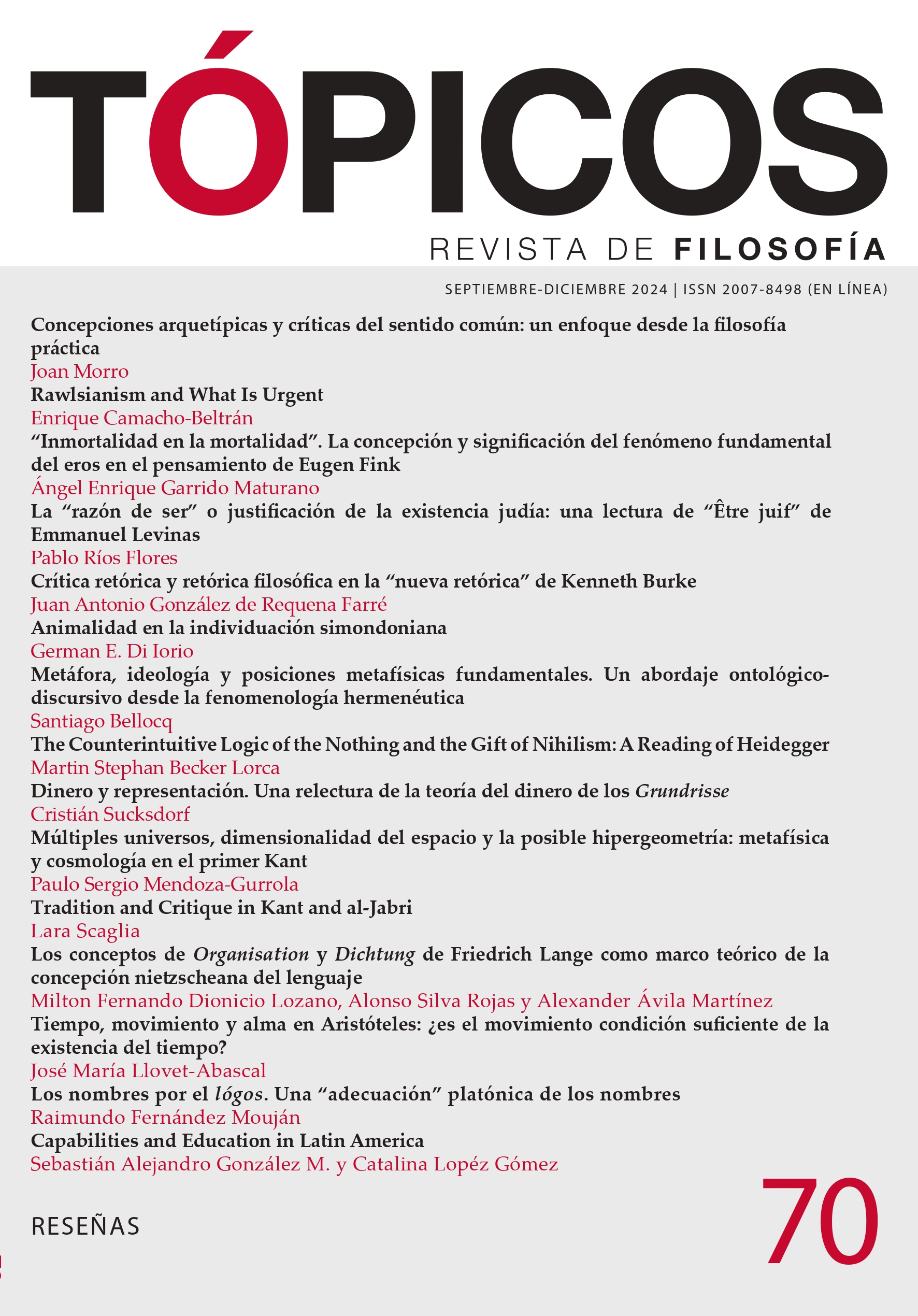Metaphor, Ideology and Fundamental Metaphysical Positions: An Ontological-Discursive Approach from Hermeneutic Phenomenology
Published 2024-08-15
Keywords
How to Cite
Copyright (c) 2024 Tópicos, Revista de Filosofía

This work is licensed under a Creative Commons Attribution-NonCommercial-NoDerivatives 4.0 International License.
Downloads
Altmetrics
Citas
Abstract
This paper establishes a dialogue between hermeneutic phenomenology—specifically that of Heideggerian inspiration—and discourse studies to reflect on the phenomenon of metaphor and its essential functioning in the production of meaning and truth, as well as in its conceptual/discursive (re)production of ideologies. There is a relative isomorphism between the operational and structural modalities of what Heidegger calls “fundamental metaphysical positions” and ideology understood according to Althusser and Van Dijk. Between the two lies the metaphor as a way of accessing the dynamics of these heterogeneous but complementary dimensions. Understanding its systematic and significant character will allow us to better understand the way in which the truth grounds our world and our factual life.
References
- Althusser, L. (2003). Ideología y aparatos ideológicos del Estado. Freud y Lacan. J. Sazbón y A. J. Pla (trads.). Nueva Visión.
- Aristóteles. (1999). Retórica. Q. Racionero. (trad.). Gredos.
- Barei, S. y Pérez, E. (2005). El orden de la cultura y las formas de la metáfora. Editorial de la Facultad de Lenguas de la UNC.
- Bertorello, A. (2022). Espacio de juego, explosión del sentido e iconicidad: un comentario híbrido al curso de Heidegger “Preguntas fundamentales de la filosofía” (1937-1938). Teseo.
- Derrida, J. (1989). La deconstrucción en las fronteras de la filosofía. La retirada de la metáfora. P. Peñalver (trad.). Paidós
- Derrida, J. (1994). Márgenes de la filosofía. C. González Marín (trad.). Cátedra.
- Di Stéfano, M. (2006). Metáforas en uso. Biblos.
- Dilthey, W. (1974). Teoría de las concepciones del mundo. J. Marías (trad.). Revista de Occidente.
- Heidegger, M. (1994). [GA 79]. Gesamtausgabe. III. Abteilung: Unveröffentlichte Abhandlungen / Vorträge – Gedachtes. Band 79. Bremer und Freiburger Vorträge. Vittorio Klostermann.
- Heidegger, M. (2003). La proposición del fundamento. F. Duque y J. Pérez de Tudela (trad.). Ediciones del Serbal.
- Heidegger, M. (2011). Posiciones metafísicas fundamentales del pensamiento occidental. Ejercicios del semestre de invierno 1938-1938. A.Ciria (trad.). Herder.
- Heidegger, M. (2012). Caminos de bosque. H. Cortés y A. Leyte (trads.). Alianza.
- Heidegger, M. (2014). El ser y el tiempo. J. Gaos (trad.). FCE.
- Hester, M. (1967). The Meaning of Poetic Metaphor. Mouton.
- Kövecses, Z. (2010). Metaphor: A practical introduction. Oxford University Press.
- Lakoff, G. (1993). The Contemporary Theory of Metaphor. En A. Ortony, (ed.), Metaphor and Thought. (pp. 202-251). Cambridge University Press.
- Lakoff, G. (2008). The Neural Theory of Metaphor. En E. Gibbs (ed.), The Cambridge Handbook of Metaphor and Thought. Cambridge University Press.
- Lakoff, G. y Johnson, M. (1999). Philosophy in the Flesh: The Embodied Mind and Its Challenge to Western Thought. Basic Books.
- Lakoff, G. y Johnson, M. (2017). Metaphors We Live By. University of Chicago Press.
- Le Guern, M. (1981). Metáfora y argumentación. L. Vélez Serrano (trad.). Semiosis, 9, 27-38. URL: http://hdl.handle.net/123456789/6253.
- Mascaró, L. (2016). Las implicancias de la circularidad de la comprensión en el desarrollo del discurso científico: un estudio acerca de la concepción heideggeriana de los tres niveles de la precomprensión. Contrastes. Revista Internacional de Filosofía, 21(2), 127-144.
- Nietzsche, F. (1996). Sobre verdad y mentira en sentido extramoral. L. M. Valdés y T. Orduña (trads.). Tecnos.
- Ortony, A. (1993). Metaphor and Thought. Cambridge University Press.
- Palacio, M. (2005). Vida y mundo. Reflexión a partir de Dilthey y Husserl. Cuadernos de Filosofía Latinoamericana, 26(92), 139-153. DOI: https://doi.org/10.15332/s0120-8462.2005.0092.11.
- Pêcheux, M. (2016). Las verdades evidentes. Lingüística, semántica, filosofía. M. Glozman (trad.). CCC.
- Ricoeur, P. (2001). La metáfora viva. A. Neira (trad.). Trotta.
- Rorty, R. (1979). Philosophy and the Mirror of Nature. Princeton University Press.
- Sartre, J.-P. (1940). L’Imaginaire : psychologie phénoménologique de l’imagination. Gallimard.
- Van Dijk, T. (1998). Ideología. Una aproximación multidisciplinaria. L. Berrone de Blanco, L. (trad.). Gedisa.
- Van Dijk, T. (2005). Ideología y análisis del discurso. A. I. Méndez (trad.). Utopía y Praxis Latinoamericana, 10(29), 9-36.
- Villa, E. M. (2018). Las metáforas en la lingüística. Análisis de algunas conceptualizaciones metafóricas de los fenómenos lingüísticos. Círculo de Lingüística Aplicada a la Comunicación, 73, 303-314. DOI: https://doi.org/10.5209/CLAC.59071.
- Vázquez, D. (2010). Metáfora y analogía en Aristóteles. Su distinción y uso en la ciencia y la filosofía. Tópicos (México), 38, 85-116. DOI: https://doi.org/10.21555/top.v38i1.107.
- Voloshinov, V. (2009). El marxismo y la filosofía del lenguaje. Ediciones Godot.





